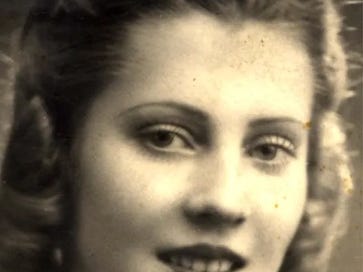Dzien Dobry everyone,
Today, I’m sharing the stories of two extraordinary Polish women, Irene Gut Opdyke and Zofia Jadwiszczok. Yad Vashem has recognised both women as Righteous Among the Nations.
While I am interested in all aspects of WWII in Poland and the Holocaust, it is the heroes that capture my attention the most.
Let’s start with Irene’s story…
Irene Gut Opdyke was born on 5 May 1922 (passed on 17 May 2003) in Kozienice, Poland.
Before the invasion of September 1939, Irene had been studying to become a nurse. Then, in 1942, at the age of 20, she witnessed a German murder an infant. Irene stated this event changed her life.
Following this event, Irene was hired by a German officer named Edward Ruegemer to work in a local hotel frequented by German soldiers. As a result, and inspired by her Catholic faith, Irene smuggled food out of the hotel and delivered it to the Jews of the Tarnopol Ghetto.
Then, she started smuggling them out of the Ghetto and assisting them to the surrounding forests, where she continued bringing them food.
Among all of this clandestine activity, Ruegemer hired Irene to also be a housekeeper at the villa he had stolen from the owners. Brazenly, Irene brought 12 Jews to the villa and hid them in the cellar!!!
When the German was not home, they would come to the house and assist Irene with cleaning!
Sadly, Ruegemer found out about the scheme. Fearing he would be exposed if other Germans found out, he promised to keep Irene’s secret and keep the Jews where they were, but only if she became his mistress! Ruegemer was 39 years older than Irene. (Pig!)
With Irene’s heroic assistance, the 12 Jews she hid in the cellar survived the war, as did Irene. In 1975, Irene was convinced to tell her story. She wrote the book "In My Hands: Memories of a Holocaust Rescuer". In 1982, she was awarded Righteous Among the Nations by Yad Vashem.
While I’m loath to mention a Nazi German when discussing a hero, Ruegemer was also awarded Righteous Among the Nations due to the survival of the Jews. (I for one, cannot believe that he received this award.)
One criterion for the award is that the awardee must have done it for no profit to themselves. I would say that blackmailing an innocent young heroic woman with death, if she did not give him sexual favours, is a form of payment or at least a benefit.
I have never in my life ever seen a less deserving recipient.
Irene, you sacrificed so much to save the lives of others. If there is a Heaven, I hope you have found your rightful place there next to all of the other heroes and victims of the Holocaust.
Let us never forget this amazing woman!
Click on these links if you’d like to read more about Irene:
Now let me tell you about Zofia Jadwiszczok (nee Flisiuk), a young hero in occupied Warsaw.
She was born on 7 May 1923 in Warsaw and exemplified the courage of ordinary Poles during the German occupation. During the war, Zofia and her mother, Maria, opened their home in the northern Warsaw suburb of Legionów to four Jewish individuals, risking their lives in an extraordinary act of humanity.
The rescued were given the shared surname Ziolkowski and a fabricated backstory of relocation from Poznan due to German expulsion.
This group included:
Zbigniew Ziółkowski (born 1920, tragically killed in 1944 during Soviet advancement)
Janusz Ziółkowski (born 1935)
Helena Libman
Krystyna Blatter née Winograd (born 16 November 1921)
Krystyna, who adopted the name Rachel, and Zofia were close friends.
An often overlooked aspect of rescue efforts during this period was the concept of "good appearance" or "good looks."
In a cruel irony of the occupation, individuals who matched German stereotypes of Jewish appearance faced heightened danger and restricted movement. Those deemed to have a "good appearance" - not conforming to these stereotypes, had a marginally better chance of evading detection.
This nuance could mean the difference between relative safety and mortal danger, highlighting the complex and often arbitrary nature of survival during the Holocaust.
It's a sobering reminder of the multifaceted challenges faced by both rescuers and the rescued in occupied Poland.
Zofia and her mother Maria were awarded Righteous Among the Nations on 11 May 1994. Thank you both for your incredible humanity and heroism.
Never forget!
Many hours of toil go into bringing you this labour of love, and it takes a small village. At the moment, all content is free for subscribers.
If you’d like to support my work and the other contributors who work with me, you can become a paid subscriber here.






